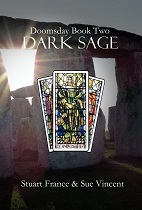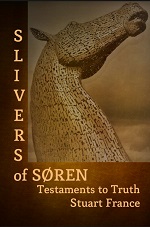I was unusually tired when I got back home from work on Sunday afternoon. With plenty of things I was ‘supposed to’ do, I couldn’t settle to anything for once and spent most of the day listening to music. My choice, an odd mix, fell on operatic arias I have loved since childhood and mediaeval music associated with the Templars. I feel I should apologise to my neighbours… not for the music, but for singing along with it. A singer I am most definitely not.
I couldn’t even muster the energy to feel guilty about doing sweet F.A. … then wondered exactly where that euphemistic phrase had originated and headed over to the computer to find out. I have always been fascinated by the origins of old words and phrases and imagined that the name must relate to some indolent lady of leisure or a character from some forgotten book…
Sometimes, you can learn a lot about the mindset, mores and daily life of a time and place by looking at the expressions it has left behind.
Most of the time, ‘sweet F. A.’ now covers a rather more ‘colourful’ expletive in apparent respectability. So, if asked, you can always say it means ‘sweet Fanny Adams’… but just who was Fanny Adams? I Googled and uncovered the grisliest of tales… one which once struck horror into the heart of the nation, but which has since been largely forgotten…
Sometimes, I wish I had left the old tales well alone…

A portrait of Fanny Adams by Illustrated Police News in 1867
Fanny Adams was a pretty and cheerful eight-year old, born in 1859, who lived in the market town of Alton in Hampshire, an area famed for hop growing. On 24 August 1867, a hot and sunny summer day, Fanny and her friends went out to play together.. in an area free of crime and an era less suspicious and alert to danger, this was a common occurence. A solicitor’s clerk, Frederick Baker, newly moved to the area, stopped to talk to them. He picked blackberries for them to eat and gave them money for sweets, then asked Fanny if she would walk with him to the next village.
Fanny refused but Baker swept her up and carried her off. The other girls went home and spoke to one of their mothers who ignored the tale, so the little girls carried on playing. Later that afternoon, a neighbour noticed Fanny’s absence and spoke to the girls, asking where she was. Hearing the tale, the neighbour went to Fanny’s mother and they set off towards the hop garden to look for the child. There they met Baker, who was pleasant and said he often gave pennies to children for sweets… and his respectable position as a solicitor’s clerk allayed their fears.
It was not until the evening, when Fanny had still not returned, that those fears returned. A group of neighbours accompanied Fanny’s mother to search for the child. In the hop garden, they found her…
Fanny’s head was impaled upon two poles: her eyes were later found in the river. The rest of her body had been savagely, brutally torn and hacked to pieces. I’ll spare you the horrific details…

The grave of Fanny Adams, Alton Cemetery.
Image: Peter Trimming, Flickr (CCL2)
After an investigation that used all the forensic methods available at the time, Baker was arrested, tried and found guilty of Fanny’s murder. He was hanged at Winchester, after writing to Fanny’s family to ask forgiveness for what he had done “in an unguarded hour”.
Almost as grisly was the macabre ‘humour’ of the British sailors, issued in 1869 with unpalatable tinned mutton, which they catechised as probably being the butchered remains of the poor little girl. The expression eventually expanded to mean anything worthless… and, by extension, the wasting of time.
I doubt I will ever use the phrase again.









































Alton isn’t far from where I live, so this unsavoury story hit me squarely between the eyes.
Hampshire prides itself as being well to do and free from scandalous behaviour, but I shall think of it a little differently from now on… I cannot imagine finding such a thing in the peaceful countryside around here…
LikeLike
It is a dreadful tale… far worse than I told here… and it is hard to imagine such horror happening anywhere… and then being forgotten.
LikeLike
That’ll teach you for wanting to educate yourself! I thought I’d read about the origin of the phrase before, but clearly not, because this was new to me.
LikeLike
I have to say, I wasn’t expecting what I found…
LikeLike
That’s a hideous story, Sue. Unfortunately, things like that continue to happen. When I think how often we children walked alone to or from school in the 1940s it’s hard to believe no one worried. Now parents would be visited by the social services in the U.S. if they let their children do that in many areas. 😦 — Suzanne
LikeLike
The freedom we had in the 50s and 60s would be frowned upon today too.
LikeLike
Pingback: Sweet Fanny Adams..? The horror behind the words… — Sue Vincent’s Daily Echo – yazım'yazgısı (typography)
Not yet in my vernacular, and less likely to enter it now! Terrifying tale.
LikeLike
I really had no idea and was shocked at the origin of what has become a fairly lighthearted phrase.
LikeLiked by 1 person
It is a terrible story! I really don’t want to hear, but it sometimes happened anyway, so be careful!
LikeLike
No matter how careful we are, such horrors still happen.
LikeLiked by 1 person
What a truly horrible story, Sue.
LikeLike
I was shocked to read where this phrase had come from.
LikeLike
I’ve never heard that phrase here, so not only did I learn that, but I learned the horrific origin story. like you, I love to find how words and phrases came to be, and what a dark twist this took –
LikeLike
Poor Fanny’s story was completely unexpected…
LikeLiked by 1 person
Etymology is a wonderful thing… usually. 😦 I never would have guessed at the tale behind that phrase. Like you, I wouldve figured something a little more hedonistic yet benign.
LikeLike
I was both surprised and shocked to find where this one had come from…
LikeLiked by 1 person
That was one thing dad taught us… and I thought it was some dig at football. Just found out the origin of ‘it gets my goat’ which isn’t gory at all. The beauty of google…
LikeLike
If we didn’t have Google at our fingertips you most likely would never have known this story. On the one hand it IS a wonder to be able to satiate our curiosity so quickly, easily and with never having to leave home — and on the other, sometimes we’d be better off being left in the dark.
LikeLike
I certainly won’t be able to use this phrase lightly again…
LikeLiked by 1 person
Nor will I 😁
LikeLiked by 1 person
I’d forgotten the story, thanks for the reminder.
LikeLike
I never knew it…
LikeLike
OMG! How awful. I think I prefer the more modern use of the term.
LikeLike
So do I… but I can’t imagine using it so lightly now.
LikeLike
What a horrific story. And it’s come down to us as so innocuous.
LikeLike
It is surprising what stories lurk behind an innocent facade.
LikeLike
My grandmother’s family all come from around Alton in various villages. From what I could gather at that time they had more than enough to cope with health and food wise without this monster in their midst… terrific post Sue..thank you xx
LikeLike
Reading the contemporary reports to write this post, it sounded like a hardworking and tight-knit community… but an event like this would devastate any community. I left so much out…
LikeLiked by 1 person
I can imagine.. devastating… x
LikeLiked by 1 person
From the Allman Brothers song
Last Sunday morning, the sunshine felt like rain
The week before, they all seemed the same
With the help of God and true friends, I’ve come to realize
I still have two strong legs, and even wings to fly
So I, ain’t a-wastin time no more
‘Cause time goes by like hurricanes, and faster things
LikeLiked by 1 person
Oh no that’s awful! Great that you’ve told about this, as I have often used the phrase, but hadn’t a clue what it meant. No I don’t think I will ever use it again.
LikeLike
I don’t think I would be able to either now, Sam.
LikeLiked by 1 person
You have reminded me of a common praise here ‘Rule of Thumb’ to also mean a general rule or common occurrence. However ‘Rule of Thumb’ was the width of a tree branch that a husband could use to legally beat his wife with (way before women had any real rights) – so I refuse to use that term anymore either.
LikeLike
I had to look it up 🙂 It seems that belief was probably based upon rumour rather than fact and the judge who was said to have made it lawful was wrongfully accused… and the phrase has been around far longer and appears to have been based on approximating measurements by thumb and eye.
LikeLiked by 1 person
I’m not sure where I learned it… but it bothered me enough to not want to use it just by association. Words transform from different languages over time to mean something completely different from what the origin was.
“The phrase rule of thumb first became associated with domestic abuse in the 1970s, after which the spurious legal definition was cited as factual in a number of law journals, and the U.S. Commission on Civil Rights published a report on domestic abuse titled “Under the Rule of Thumb” in 1982.” Interesting history. Thanks…
LikeLike
I understand why you wouldn’t want to use it.
LikeLiked by 1 person
Pingback: Smorgasbord Blogger Daily – Monday February 17th 2020 – #Interview Norah Colvin, #Writing Eloise de Sousa, #Horror Sue Vincent | Smorgasbord Blog Magazine
Poor little Sweet Fanny Adams… How horrific, Sue. We used the expression many times years ago.
What a monster the murderer was! x
LikeLike
It is a common enough expression… but I wonder how many would use it if they knew her story? x
LikeLike
I am so shocked, I have heard this story before but totally blanked it! It all coming back to me…and so near to where I live ! 💜
LikeLike
It is a dreadful story… x
LikeLike
Yes it is 💜
LikeLiked by 1 person
It’s not a phrase I’ve used in decades, and I certainly won’t ever use it again. 😦
LikeLike
Nor, I think, will I after learning her story.
LikeLiked by 1 person
What an unpleasant story. I agree with you, Sue. I rarely, if ever, used the phrase but never will again.
LikeLike
I toned it down a lot for the blog too…
LikeLiked by 1 person
Thank you. I appreciate it. That was enough for me.
LikeLiked by 1 person
Yes, perhaps some old tales are better left alone. So tragic.
LikeLike
She is better remembered with silence, I think, than a lighthearted expression…
LikeLiked by 1 person
Definitely!
LikeLiked by 1 person
Ghastly, but thank you for it.
LikeLike
A terrible page in our history.
LikeLike
How utterly dreadful.
LikeLike
I had no idea of the origin of this phrase..
LikeLiked by 1 person
I’d never heard the phrase before.
LikeLike